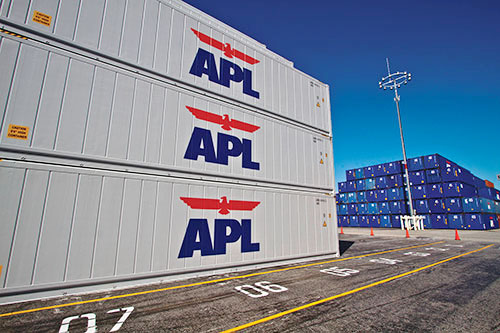So cool it’s hot: APL’s ‘reefer’ biz
 What is driving the demand for refrigerated container shipping globally and in Vietnam?
What is driving the demand for refrigerated container shipping globally and in Vietnam?
Two key factors are driving the growth globally. The first is population growth and increasing affluence of consumers, resulting not only in rising demand for fruit, vegetables and other fresh produce, but also in the demand for more variety. The second is the ability of air and sea transport in overcoming transportation risks through improvement in shipping services, technology and knowledge of consumers.
In Vietnam, there is increasing demand for poultry, seafood, agricultural products and fruit imports and exports. The Vietnam Association of Seafood Exporters and Producers (VASEP) reported that over the last five years local seafood exports have grown an average of 11 per cent annually. The association expects seafood exports to increase 5 per cent this year to $6.5 billion.
What are APL’s capabilities in the Vietnam ‘reefer’ trade?
APL has operated in Vietnam for over 30 years and we have a presence all over Vietnam, including Ho Chi Minh, Hanoi and Haiphong.
APL ranks among the largest shipping lines in Vietnam and is the market leader in shipping refrigerated container cargo to various parts of the world, notably the US, Europe, Japan and the Middle East. The commodities APL ships in and out of Vietnam include fish, shrimp, poultry, vegetables and fruits.
How can APL benefit exporters?
Being of high value, refrigerated shipments require reliable service and short transit times. APL has 10 services calling Vietnam each week, offering frequency, favorable transit times and direct delivery to an extensive network of destinations.
APL has ample availability of high quality empty refrigerated containers, which shippers can conveniently pick up from various inland container depots (ICDs) and ports. We also offer innovative and cost-saving solutions, such as on-site pre-trip inspection and re-use of import container for exports, which reduces trucking costs.
APL has made significant investments in new refrigerated container technology to meet the varying demands of exporters. Innovative technologies such as Controlled Atmosphere (CA) give shippers a viable alternative to costly air-freight shipments, thus saving them considerable cost. Having the technology alone is not sufficient – APL’s market knowledge, local specialised expertise and ground handling capabilities distinguish its reefer capabilities.
In Vietnam and as in most countries, APL has a dedicated sales and customer service team to meet the unique requirements of reefer customers.

APL is a leader in refrigerated and climate controlled shipping
What are some of the specific technologies APL uses?
APL’s refrigerated shipping technologies and expertise include Controlled Atmosphere, Regulated Atmosphere, Cold Treatment, and SMARTemp. At the same time APL is able to provide specialised temperature control services – such as Ultra Low temperature (ULT) and High Temperature Low Humidity (HTLH) – that shippers may require for certain types of products.
In the reefer container services, we seek to control elements such as humidity, temperature and transit times in order to maintain the quality of the fresh produce cargoes being shipped.
Regulated Atmosphere (RA) and CA help extend the shelf life of fruit and vegetable shipments by slowing down the product respiration process through the use of CO2 or Nitrogen. The slower the respiration, the longer the shelf life of the fresh produce.
Cold Treatment – essentially the consistent maintenance of a specified low temperature for fresh produce cargo over a defined period – helps eradicate pests. CT technology helps reduce the use of GHG-based pest control alternatives in the shipping of fruit and vegetable cargoes. CT now has increasing regulatory applications.
SMARTemp involves satellite-based temperature tracking to provide live temperature data feeds from reefer containers, triggering signals to shore offices in the event of tampering or other detected anomalies. Most temperature monitoring tools in the market are based on GSM technology which is not available in high seas.
What are the opportunities and challenges for the Vietnam reefer trade this year?
Generally, changes in weather patterns this year have affected harvests, quality and market supply for certain produce. Trade sanctions and protectionist measures have been observed to impact import quotas and regulations between some countries. The cost of servicing reefers has also increased.
On the other hand, Vietnamese food products are gaining importance and traction around the world, and as an importing nation, the country has been opening up to global markets.
Adoption of advanced and innovative technologies such as RA and CA is still low in Vietnam presently. Hence, there is an opportunity for shippers to leverage these technologies. If successful, this helps save cost and enhances the competitiveness of Vietnam exports. APL has worked with various shippers in trying out these technologies and the results were shown to be promising.
APL has recently launched a new service to New Zealand and Australia, called the New Zealand-Asia Express (NAX). Started in early September, NAX will help ship fresh produce from New Zealand to Asian hubs, including Vietnam.
What the stars mean:
★ Poor ★ ★ Promising ★★★ Good ★★★★ Very good ★★★★★ Exceptional
Latest News
More News
- State corporations poised to drive 2026 growth (February 03, 2026 | 13:58)
- Why high-tech talent will define Vietnam’s growth (February 02, 2026 | 10:47)
- FMCG resilience amid varying storms (February 02, 2026 | 10:00)
- Customs reforms strengthen business confidence, support trade growth (February 01, 2026 | 08:20)
- Vietnam and US to launch sixth trade negotiation round (January 30, 2026 | 15:19)
- Digital publishing emerges as key growth driver in Vietnam (January 30, 2026 | 10:59)
- EVN signs key contract for Tri An hydropower expansion (January 30, 2026 | 10:57)
- Vietnam to lead trade growth in ASEAN (January 29, 2026 | 15:08)
- Carlsberg Vietnam delivers Lunar New Year support in central region (January 28, 2026 | 17:19)
- TikTok penalised $35,000 in Vietnam for consumer protection violations (January 28, 2026 | 17:15)
















 Mobile Version
Mobile Version